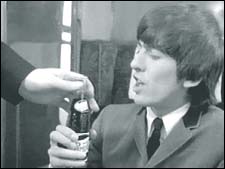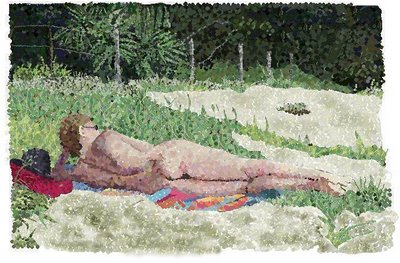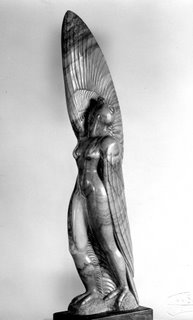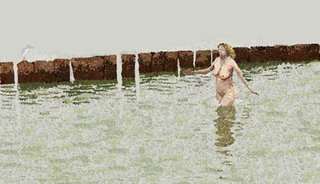Tad Richards' odyssey through the catalog of Prestige Records:an unofficial and idiosyncratic history of jazz in the 50s and 60s. With occasional digressions.
Sunday, December 17, 2006
Harvey with a student
Thursday, November 30, 2006
Thwarted
1) How do you look at your original insight, inspiration, idea for your writing? Is it something that you control, or is it something with a life of its own? (I'm talking about the main idea of a book, not necessarily the characters or anything else)
You control the main idea -- the original insight. And while it comes from somewhere, you can generally trace where it comes from. The novel I've just finished, "Nick and Jake," comes from many conversations with my brother (we co-wrote it) over the years about the idea of having the main characters of The Great Gatsby and The Sun Also Rises meet, 25 years later, after WWII. We were prodded to start writing it post 9/11, post- George Bush's destruction of the worldwide concern and good will for America. We started thinking about how that happened post WWII, in the 50s McCarthy-CIA era, and realized our Nick and Jake story would be a perfect vehicle.
Now we're getting ready to start work on another book we've wanted to write for years, and the inspiration for this is our heritage -- our parents and their friends, the people we had for role models growing up. It'll be a historical novel about the Woodstock artists' colony in the 20s and 30s, and a theme involving two artists whom we respected and admired, who came to be rivals.
2) How do you develop your characters, scenarios, or the main ideas for your writing? How do you test out different ideas for characters, for example?
That really comes from the writing. This is not a usual experience, but if you're looking for odd stories from the writing life. My brother Jon and I live on opposite sides of the continent, and we decided to try and collaborate by email and instant message. That led to the choice of an epistolary novel, although we might have chosen it anyway. So our character development -- of the main characters, and the supporting characters -- came, to a considerable extent, by daring each other -- "let's see what you can do with this!!!" It proved to be a wonderful technique.
And last of all, the most important question for my purposes (and I think the most interesting one of all):
3) So, when its all said and done, do you feel that you lose control of your characters in a way? Does your perception of them change over time? Do you find them doing things you didn't forsee or plan? Do they take the book in a different direction than you intended? Why do you think this is, if at all?
I just read something terrific in an interview with a woman who choreographs fight scenes for stage productions. She was talking about choreographing a duel between two topless ladies.
The interviewer asked: Did you start stripping from the beginning, or work up to it gradually?
Choreographer: We choreographed all the fights first, concentrating on what you always concentrate on when creating a fight --
What story is being told?
How would these characters fight in these circumstances?
What choices do they make to accomplish their goals?
What do they do when thwarted?
So when we began to rehearse with the shirts off, we found that no changes were necessary.
You probably can't use the topless part of it in your paper, but the rest is incredible -- it's exactly what we need to do in writing a story. And the part about the choices characters make to accomplish their goals. and what they do when thwarted -- well, you can see exactly how that applies to stage fighting, but it applies to creating characters too. And you really don't know before you start -- have to discover in the writing -- the choices -- emotional, psychological, strategic, well-chosen, poorly chosen -- that your characters will come up with until you put them into a situation. And you certainly don't know what they're going to when thwarted until you put the obstacles in their paths.
One more story -- I once had to write a novel very very fast, against a deadline. At a certain point in the novel, the heroine has to plead with her old lover, now the leader of a revolution, for the life of her new lover. I knew, because I'd outlined the whole story, that she succeeds. But when I got to the scene, I couldn't figure out how. What could she possibly say? I didn't have time to wrestle with it, because of the deadline. But I was stuck, and I couldn't afford to be stuck. I decided to go ahead and write the next chapter, and come back to this, but I couldn't do it. Too linear. So
I came up with a solution out of desperation -- I never would have done this in my right mind. I decided to fool myself. Write "Chapter 14," then write seven or eight pages of total gibberish, then write "Chapter 15." So I did. And I got to the end of the book. And when I came back to actually write Chapter 14, I found to my amazement some phrases that contained psychological insights that would work for the confrontation. Who knows where they came from?
The interviewer was my friend Mary Shen Barnidge, for her newsletter about stage fighting, Moulinet. The interviewee was Dawn "Sam" Alden of Babes With Blades.
Saturday, November 25, 2006
The Dead
Thursday, November 09, 2006
Congratulations
northern Westchester and all of Putnam, expanding north to cover most of Dutchess County, traveling through northern Rockland County, then gobbling up most of Orange County all the way to the New Jersey and Pennsylvania borders. The district is a fascinating mix of suburban wealth, rural quiet, farmland and small-town struggles. While not quite a microcosm of New York state - the district lacks big cities and their problems - the 19th does bridge upstate with downstate, even reflecting "middle America'' and its struggles.
The first rock star ever to make the move to Congress, John is no stranger to local politics, and no stranger to involvement with major issues. I'm confident that he'll join Maurice Hinchey in giving the Hudson Valley some of the strongest and best representation in Congress.
Opus 40 in the Autumn
Our big autumn job this year is cleaning out the Shallow Pool, the big one by the meadow. It's long overdue, but it's being done. We're probably about three quarters of the way through it, as of last weekend. Most of the leaves and muck are out, and it looks like this:

Not beautiful yet, but a huge advance. Last night it rained, so the pool needs to be pumped again, but not very much. This time we'll also bring in a mudsucker to get down into the last layer of leaves and suck out all the water, so we can get everything.
The pool won't really fill up till next spring, but a little water will come back into it, so when it freezes this winter we'll have a sunken ice rink. I'll get photos of that, too.
Wednesday, October 04, 2006
Big Soggy Issues
Exercise
First forget what time it is
for an hour
do it regularly every day
then forget what day of the week it is
do this regularly for a week
then forget what country you are in
and practice doing it in company
for a week
then do them together
for a week
with as few breaks as possible
follow these by forgetting how to add
or to subtract
it makes no difference
you can change them around
after a week
both will help you later
to forget how to count
forget how to count
starting with your own age
starting with how to count backward
starting with even numbers
starting with Roman numerals
starting with fractions of Roman numerals
starting with the old calendar
going on to the old alphabet
going on to the alphabet
until everything is continuous again
go on to forgetting elements
starting with water
proceeding to earth
rising in fire
forget fire
The poem did not get a hugely positive response. The negative was best expressed by Bob Grumman, who said “My problem with it is that it's by someone trying to give us Sage Advice rather than poetry, which can be so much more than Sage Advice.” And I think he was right. I kinda like the poem, but it doesn’t pass the “hair standing up on the back of the neck” test. And I think it doesn’t for the reason Bob stated. You’re interested, to the extent that you're interested, because of Merwin’s sage wisdom, not because of any crackling excitement from the language, the imagery, even the rhythm.
I posted this one, as another poem on the same theme, which is a poem, not sage advice. This one by Don Finkel, and originally published in Cortland Review:
Burden
Nouns were the first to slip away.
Was it because they were easier to forget,
or the most dispensable?
Funerals back then were milling
with nouns whose names he'd forgotten,
if he'd ever met them.
Evidently, somewhere out there
a swarm of improper nouns
had prospered and multiplied.
Odd nouns came knocking every day
looking for work, till the old bard
left off answering the door.
Verbs were beasts of another persuasion.
For a while some stayed behind,
pacing the halls or curled on the living room sofa.
But they had to be fed. Some nights
they sank their claws in his thigh
when they were hungry.
As the last syllable crept away,
he felt a peculiar lightness,
like the wisp that rises,
from a smoldering wick—
as if words were the burden
he'd been bearing, all his life.
And this one makes all sorts of things dance up and down my spine.
And it connects to a question I’ve been thinking about a lot, in working with intro to creative writing students – the Big Soggy Issue question. You can tell them not to write about Big Soggy Issues, but you can’t …sigh… stop them from doing it. But good poets, even great poets, write about Great Soggy Issues, and take the sog out of them. Why isn’t “Crossing the Bar” a BSI poem? Well, it doesn’t waste any words, it has that great control of meter than only Tennyson could manage, and it has wonderful moments of language like “moaning of the bar” which works the way an image is supposed to: accurate and evocative.
Merwin’s poem won’t let you forget that it’s about forgetting, mortality, Alzheimer’s. Finkel lets you into a magical world, and in your sojourn there you discover that it’s about those things.
What are the best BSI poems? The ones we should show to our students and say, “Here – these work”?
Friday, September 29, 2006
And How About My Website?
But leading the website hit parade is not Opus 40, oddly enough, but "stackolee poem," which got three hits, all from Memphis State University, and the Memphis student do stick around for over three minutes -- long enough to follow the link to Anny Ballardini's page and read the poem.
opus 40 comes in second -- actually tied for first with 3 hits, but way ahead on time -- someone from New Jersey, credited with over 22 hours dallying on my site. Musta fallen alseep...?
Next "Ozymandias," and the Shelley lover from Indonesia, searching for images of Ozzy, spent 20 seconds on me, which is long enough to look at a picture.
"tad richards poetry" -- that has to be me, doesn't it? So you'd think whoever did that search would actually spend some time looking at the poems, but no. Zero seconds. This is that Reston, Virginia address that keeps accessing my websites - probably some sort of data mining tool.
"poetry portraits" -- I know people do access the poetry portraits page from time to time, but this guy from Groningen in the Netherlands apparently didn't find what he was looking for.
Other intriguing hits that added up to nothing: "poems about moles" and "hanging judge stories from appalachia."
Who could have been looking for "richard hale curtis," one of my more obscure pseudonyms? Probably a genealogist.
"mole richards" makes equipment for theatrical lighting. Who knew?
OK, Who Else Reads This Blog?
- Bly Richards
- Someone looking for Robert Bly and me? That can't be. And apparently, it wasn't. Both "Bly Richards" hits (one from Virginia and one from Florida) stayed on my site for zero seconds.
- What could they have actually been looking for? Aha! Actually I'm fourth on the "Bly Richards" Google page, but the first three belong to a dancer named Bly Richards, "the winner of the reality dance show Bump'n'Grind II which aired on Trouble TV in May, 2006." Bly's measurements are listed as 34-30-32, and she wears a size 8 shoe. Wait...
 Bly's a he. But you gotta figure he can bump and grind.
Bly's a he. But you gotta figure he can bump and grind.
- Nude wives
- With all the nude wife sites out there, they ended up on my blog? Has to have been a mistake, and sure enough, it is. Zero seconds. The weird thing is, there are two "Nude Wives" hits in two consecutive days, both from British Columbia. Did the guy forget what a washout I was the first day?
- I'm on page 2 of Google's search.
- if i had a girl and she dance
- This goes to my post about square dancing at Wilgus's. I'm guessing I have a shot at this one...the person really was looking for an old square dance call?
- Nope. Another zero seconds. What could this searcher actually have been looking for? It's hard to figure it out, but the most popular result seems to be an altogether different song lyric, probably not square danced to all that much:
If I had a girl and she was mine I'd paint her tits with iodine...
- what does memories of west street and lepke poetry mean?
- Zero seconds, and although it would be nice if someone would stop and read me for at least a second or two, I'm just as glad not to be lingered over here, by some guy who can't figure out what "Memories of West Street and Lepke" is all about, and wants someone else to write his paper for him. "What does poem X mean?" is the wrong question, anyway.
- Famous poems about first kiss
- I guess my student's wasn't famous enough. Or maybe this searcher didn't like poems with bats in them. But it was better than this one, from near the top of the list: "For each moment which passes, I will forever remember the first kiss, the first time our lips touched and ..."
- the plantation by george mcneill
- No seconds. This person was probably looking for the book, and more power to them...my old friend George deserves to be read.
- subtle power of language
- Sigh...zero seconds. You'd think someone would want to find out what I thought about the subtle power of language.
So...does anyone ever read my blog? My visitor's pie chart says 75% no, which means that the glass is one quarter full...25% at least glance at it.
Thursday, September 28, 2006
Who Reads This Blog?
I use a service called StatCounter, which gives all sorts of interesting information, like Keyword Analysis. Keyword Analysis tells you what people were looking for, when they found you.
Unsurprisingly, 11 of the 47 keywords tracked were "Opus 40."
After that, with 9 hits, is "blog using microsoft paint computer art." Who knew anyone made searches that specific? Using the "drill down" tool, I discover that this searcher came from Australia. There's someone in Australia who also uses Microsoft Paint for computer art, too.
Also interesting is what else you find when you google "blog using microsoft paint computer art." I'm at the top of the list, right after Microsoft. There's Tom Moody, who does some neat stuff, and who, like me, started out using MSPaintbrush, which no longer exists.
Another blog discusses pixel art, which it defines as "anything drawn in the medium of computer pixels - these are usually created one pixel at a time at small scale to reduce the time taken to create the images." Which I guess is what I do. The blog also praises "The beauty of Pixel Art [for] the clean and unique image they can create," which doesn't describe me...I go for just the opposite effect.
It also says that "Creating Pixel Art seems to be a slow process, mainly in MS Paint, drawing pixel by pixel," which is certainly true.
It also links to another site which offers a tutorial on pixel art, which is fascinating, but not at all relevant to what I do.
So I guess I'm not a pixel artist. Which means I still don't really have a name for what I do. Maybe I should use George Harrison's paradigm:
"What do you call that haircut?"
"Arthur."

Well, I've gotten distracted, and lost the "Who Reads This Blog?" thread, but I'll get back to it.
Sunday, September 17, 2006
Dylan's Frail Flowers
The Greenwood Encyclopedia of American Poets and Poetry, a pretty complete reference book (and one I contributed to, but on 20th Century poets, doesn't have an entry on him and they're pretty exhaustive (and right now, I'd guess, kicking themselves for not including Timrod).
He was better known in his day. Tennyson lauded him as "the poet laureate of the Confederacy."
Anyway, here's the story:
While experts have not directly accused Dylan of plagiarism over the songs on his latest album, Modern Times, which is number one in the US charts, they say there appears to be little doubt that he has liberally "borrowed" from the works of the Confederate poet Henry Timrod.
For instance, the lines in his song "When the Deal Goes Down", in which Dylan sings: "More frailer than the flowers, these precious hours", bear a striking resemblance to lines contained in Timrod's "A Rhapsody of a Southern Winter Night", which reads: "A round of precious hours, Oh! Here where in that summer noon I basked, And strove, with logic frailer than the flowers." Elsewhere in the same song, Dylan sings "Where wisdom grows up in strife" - very similar to a line in Timrod's poem "Retirement", which reads: "There is a wisdom that grows up in strife."
Walter Cisco, author of a biography of the poet...said he was certain that Dylan had borrowed from the writer... "It's amazing. There is no question that is where it came from. It's too much to be a coincidence. I'm just delighted that Timrod is getting some recognition."
Plagiarism? I'd be hard pressed to say yes, though it raises some interesting questions.
I've stolen larger chunks than the ones Dylan took from Timnrod to put into poems, but they weren't from other poems.
Here's one:
THE CROCODILE PEOPLE
They used to practice cannibalism, until
they went away from the river
when the colonists came. It’s said
they have some power over the crocodiles.
But since they pulled back, humans are scarce,
reptiles live in trees. Oh, you’ll still hear
the odd story – a child crunch’d, a maiden bathing
surprised by one, two, three, shuffling from the bank.
Mostly, though, things change. You lose the taste
for long pig, and make a virtue of it.
Crocodiles, neglected, no longer smile for you.
Their memory is ancient, but shallow.
The entire first stanza of that comes from a Johnny Weissmuller "Jungle Jim" movie, watched on TV one Saturday morning. I heard that line, grabbed the nearest envelope I could find, and wrote it down, knowing that it had some power over me, though I didn't know what. But that's "found poetry," finding the poetic in something that wasn't meant to be poetic. Dylan is finding the poetic in something that was meant to be poetic.
The great blues composers, like Robert Johnson and Leadbelly, borrowed all the time from earlier songs -- it was an accepted practice. I've heard Leadbelly criticized because "Goodnight Irene" was -- in the critic's view -- essentially a rewrite of a sentimental 19th century lyric. And I've seen the poem in question, not that I could find it right now. It's terrible, and "Goodnight Irene" is a masterpiece.
Christopher Ricks, author of “Dylan’s Visions of Sin,” a book I liked, saidto the NY Times,
I may be too inclined to defend, but I do think it’s characteristic of great artists and songsters to immediately draw on their predecessors.” He added that it was atypical for popular musicians to acknowledge their influences.
Mr. Ricks said that one important distinguishing factor between plagiarism and allusion, which is common among poets and songwriters, is that “plagiarism wants you not to know the original, whereas allusion wants you to know.”
“When Eliot says, ‘No! I am not Prince Hamlet, nor was meant to be’ — to have a line ending ‘to be’ when the most famous line uttered by Hamlet is ‘to be or not to be’ — then part of the fun and illumination in the Eliot poem is that you should know it,” he said. But he added: “I don’t think Dylan is alluding to Timrod. I don’t think people can say that you’re meant to know that it’s Timrod.”
I probably shouldn't quote from myself twice in the same blog entry, but this is maybe relevant in a different way. It's a -- not exactly a translation, because I was translating a memory of something I hadn't read in thirty years.
A PAINTER OF REALITY
‑‑adapted from the memory of a poem by
Jacques Prevert, read 30 years earlier
There's a story about a painter
of reality in the South of France
or one of those islands
like Ibiz or Majorca
where the sun's ego runs wild
and color is a riot
of civil disobedience
In front of this painter is an apple
on a white plate
on a window sill
the color the sun decreed
the painter of reality
addresses the apple sternly
orders it to reveal
its external core
But the apple spins
in its molecules
prismatic to the sun's reality
hermetic to the painter
of reality
He breaks for lunch
bread and cheese
white wine
a boiled potato
leaving the apple
to reflect on its self‑absorption
At just that time
along comes Picasso
a spectral swirl
a many‑hued presence
always where he's needed
And Picasso eats the apple
and the apple says thanks
and Picasso walks down to the ocean
leaving a shower of seeds
strewn across the plate
Prevert had the painter, and the apple, and Picasso, and the apple thanking Picasso for eating it; I'm not sure how much else. I credited him in my epigraph, but my poem was later set to music and recorded by Fred Koller (here's the song), and he didn't include the epigraph. I don't know if the frail flowers are going to be thanking Dylan, but I don't think they'll be cursing him.
Monday, September 11, 2006
Lying Still Like Stones or Wool
What I try to get at in class is not so much which one is better, but how Belitt and Bly have written two completely different poems, and how quickly they veer away from each other. By the end of the first line, they're already as different as night and day. Bly declares total hopelessness, total nihilism, whereas Belitt may be tired of being a man, but he holds out a hope of transcendence of his "just a man" state.
That difference is continued and magnified as the two poems continue into the second stanza. Bly wants nothing less than total annihilation -- not death, but the elimination of any connection to life or humanity -- to lie still like stones or wool. Belitt can be rejuvenated by a little vacation from things. And the mundane things that tie us to the life of human society -- Bly wants only not to see them. Belitt's not so total in his rejection -- he'd just rather not look at them.
So the violent fantasy that's Bly's only connection to life is less than that for Belitt. It's part of his vacation -- Violent Fantasyland.
Bly doesn't want to go on being sentient. For him, being alive is like being a root in the dark. The life of the senses is shivering with sleep in the moist guts of the earth.
For Belitt, that kind of sentience isn't the sum total of life, just of the kind of life that he no longer wants to have.
And finally, Bly comes to a kind of accomodation with life. He accepts total nihilism, and he can stroll serenely through it. Belitt strolls through it too, but playing it cool, still looking for an out -- that presumably, by playing it cool, one should be able to find.
So there you have it. How much more different can two poems be?
Personally, I like the uncompromising nihilism of Bly's version. My class this week was evenly divided, and there's no right or wrong choice. But mostly, I love how the comparison illustrates the subtle power of language.
Why do we have language? What's the advantage of it as a system of communication? Language allows us to distinguish between things. Written language, with its complexity, allows us to make more complex distinctions. And the language of poetry allows us to make distinctions that are at once subtle and immense.
Here is Neruda's original.
Saturday, September 09, 2006
I Still Love Baseball
As a Mets fan, I should be embarrassed about writing a pro-Braves song, and I am, slightly, but I did write it with an audience in mind, namely the country music audience, so I set it in the South. Anyway, I'm not embarrassed by the song, which I still like. Here it is:
I Still Love Baseball
Thursday, August 31, 2006
Two Nudes

People ask me from time to time how long it takes me to complete one of these pointillist pieces, so I've started noting when I start and when I finish them. "Nude on Chair With Muybridge Figures" took close to four weeks; "Nude on Blanket With Sand," amazingly, only one week, but I was working pretty intently. Because of the way I do these -- working in Microsoft Paint, and building in the color deterioration that happens in Paint -- I always do two paintings at a time, because in order to get the full effect of the color breakdown, I have to constantly save and reopen an image. That's why the pointillism -- I work in dots of color which will break down as long as there's empty space around them, then build in more and more dots until they finally come together in an area of color. I've been working on a large and complex one, and I finished the Muybridge nude in the middle of it, so I had to start another, and the nude in the sand got the call. She's now finished too, and I still have a little more to do on the other picture. So, yes, I've started a new one.

Newsweek
Saturday, August 26, 2006
Naming things
Anyway, I digress. My point was the firmly-in-cheek tongue placing for "21st century pointillism," a term offered to me by James Cox of the James Cox Gallery -- thanks, Jim. I present the label with tongue firmly planted in cheek, but not the art. I take what I do seriously, even though I'm a little shy about labeling it seriously.
My stepfather, Harvey Fite, had the same problem, of course. His line in the sand came even earlier -- he didn't just resist categorizing his great masterwork, even resisted naming it. For years he called it "High Woods," after his beloved community where he had chosen to settle and create. As it started growing in reputation, people started looking for a name. The brilliant photographer

Maria Layacona, did an article on Harvey in the early Fifties, and called it "Fite's Acropolis in the Catskills" (photos by Maria included here).
Harvey was honored, but a little embarrassed, and eventually he realized he was going to have to give his work a name.
"Composers have it easy," he would joke. "They don't have to name things, they just number them -- Opus 1, Opus 2, and so forth." From the joking came a name -- Opus 40. Not Harvey's fortieth work, but forty years of work.

As for "environmental sculpture," "earthwork," or similar genre-defining names, Harvey never considered them. In subsequent years, it's occurred to me that Harvey was working within two artistic concepts that didn't have names while he was doing the work, but have acquired names since. One, of course, is "environmentalism." Harvey was very much aware of nature as Opus 40 developed under his hands": the lines of the mountain that became its backdrop, natural pools, trees. He was aware that the quarrymen who were his High Woods forefathers had carved a life and a living out of the native bluestone, but they had not left nature the way they found it. And with respect for them, but also respect for nature, he set out to make amends to nature for what human beings had inflicted on her.
The second name that Harvey never heard or used was "multiculturalism." But Opus 40, the first glimmerings of which stirred in Harvey during his residency in Copan, contains within it Harvey's sweeping love for, and awareness of, so many sculptural traditions.
How much are we limited by naming what we do? In many ways not much, and all too often artists who say "my work resists category" mean, whether they know it or not, "my work is too formless and uninteresting to have a category." Certainly "landscape," or "sonnet," or "concerto" don't limit an artist in any important way, and they do give him or the boundary and structure that art needs. Even Opus 40, which really is sui generis, can be categorized as "dry key stone masonry" or probably even "environmental sculpture," though it wasn't a current phrase during Harvey's lifetime.
Other labels are more problematic. The Beats mostly chafed against being called Beats. Pound founded Imagism and then disavowed it. The Impressionists exhibited together because no one else would have them, but I don't think they thought of themselves as having a clubhouse and a secret handshake.
So what's wrong with "21st Century Pointillism"? Maybe the same thing that's wrong with "claims he is the only artist working in the genre." Too self-aggrandizing? A lot of poets, myself included, are nervous about calling themselves "poets." "Poet" is something we aspire to be, something that Keats and Dante were.
Tuesday, August 22, 2006
Poetry's Rat Pack
Sammy sings with that authority that's imposed on a song. Frank, on the other hand, has an authority that's just there...he never has to show it. I'm not sure I'm saying one way is better than the other, but since Frank was the greatest pop singer of all, I suppose I am. Dean doesn't concern himself with authority at all; he's an egalitarian sort of guy, as he approaches a song.
Wondering how much further I could stretch this, I considered the some of the other ballad singers of the era. Elvis, who at his best approached a song more as a supplicant than an authority. Johnny Mathis, who pretends to supplicate, but actually holds the whip hand -- the Uriah Heep of singers, without the whininess.
We look to find and establish a voice in whatever art form we practice, and this issue of relationship to the material is part of that establishment of voice. I wonder if one could look at poets the same way? Frost our Frank, Stevens our Sammy, Williams our Dean?
Friday, August 18, 2006
Some heartfelt thanks
Sunday, August 13, 2006
Who's That Nude?
A comment from one studio tourist: “I don’t like nudes as a rule, but I do like these.”
It’s always nice to have someone like your work, and you probably shouldn’t question why, but it’s hard not to theorize a little, so I started wondering what sets my nudes apart from others.
I know that when I work in graphic arts, I feel it as a total break from writing. I don’t think with words; I don’t think about theme or symbol; I give myself up completely to eye and hand.

But I wonder if that’s as true as I’ve always assumed it was. Maybe my nudes are, to some extent, a writer’s nudes, in that I’m always, to some degree, creating character. I suspect the same is true with my animals.

I work mostly from photographs. I don’t necessarily follow the photographs literally, and sometimes I’ll grab images from more than one source. But I don’t have much in the way of a visual memory. I can’t remember exactly how a head fits on a neck if I’m not looking right at it, or how an arm hangs at someone’s side. I don’t remember what color people’s eyes are, or how someone’s hairline looks. And because, at least with the pointillist works, I spend a lot of time on each image, it would be wildly costly to work from a model.
Besides, while there are things you can get from a live model that you could never get from a photograph – depth, real color, and, well, life – there are things you can get from a photograph that you won’t necessarily get from a live model. A photograph is a moment in time, and sometimes that moment will reveal something unexpected.
I probably shouldn’t admit this, but I get a lot of my models by surfing those Internet sites where people post nude pictures of their wives and girlfriends. They work for me because they’re bad photographs, so I don’t have to work through someone else’s aesthetic vision, and because sometimes they’ll reveal something unexpected. You might have to look through a hundred pictures, which is a lot less fun than it sounds like, to find that unexpected revelation. But they’re there, and you know them when you see them.
Saturday, August 12, 2006
Art and Perception
Ironically, I can’t find a link to Ref’s mural online, but Wendy Jones’s studies can be found here,
The competition caused some serious rents in the Woodstock community, and the destruction of friendships. Many thought that Wendy Jones should have won, and that Ref’s work was more facile, less profound.
I don’t want to comment on that. I held both men in the deepest regard, personally and professionally. Wendy died when I was still a teenager, but his sons were my best friends, and his surviving son, Peter, remains my oldest and closest friend. Ref was a mentor and role model to me; he influenced me profoundly.
But I’ve been thinking recently about the assignation of roles to them: Wendy the depth and nuance, Ref the flash and commercialism. Was this real? Did Ref win the competition because his work was flashier and more commercial?
Or is his work seen as flashier and more commercial because he won?
Did winning competitions and commissions turn Ref into an artist who began to play it safe? And if Wendy had won this hugely prestigious commission, and Ref had lost it, would Wendy have been the one to start to play it safe?
I don’t believe any of this. But I believe the perception exists, and not just in this long-forgotten example. I don’t believe Ref’s burning artistic integrity was compromised by success, and I don’t believe Wendy’s would have been (he did enjoy success and prestige during his career). But I suspect that although the work would not have changed, the perception would have—that Wendy would have been categorized as the facile one, Ref the unjustly overlooked soulful one. And none of this perception would have had anything to do with art.
Thursday, August 10, 2006
Harvey at St. Stephens
(Bard/St. Stephen's never seems to have produced many of these)." She passes on information about Harvey that I never knew: "Apparently, he was in a fraternity, and played la crosse."
Thursday, June 29, 2006
Grumman taxonomy update
Yahoo spyware
Sunday, June 25, 2006
Carved Sculpture
 Gluttony, 12"x9"x9", travertine. We're not sure of the dates of any of these. A guess on this would be late 40s-early 50s.
Gluttony, 12"x9"x9", travertine. We're not sure of the dates of any of these. A guess on this would be late 40s-early 50s. Megalomania, 30.5"x7"x4", marble. I'd place this one in the early 50s, possibly carved in 1950 when Harvey and Barbara spent a year in Rome.
Megalomania, 30.5"x7"x4", marble. I'd place this one in the early 50s, possibly carved in 1950 when Harvey and Barbara spent a year in Rome.Both of these are in my collection, in the house at Opus 40.
Thanks to Cindy Bell for cataloging all the carved pieces we have records of.
Friday, June 23, 2006
Opus 40 in the News
Friday, June 02, 2006
Richards Pushes Grumman's Taxonomy to the Breaking Point
why I don't just junk my taxonomy on the grounds that it must be worthless if it has any problem with an obvious poem like Richards's piece.
But he stays with it, and Grumman as theorist is always weird and interesting. So I recommend it. I think.
A Patrician Baritone
who speaks in a patrician baritone and resembles a stockier, long-haired George Plimpton.
Wednesday, May 31, 2006
Happy Birthday Walt Whitman (etc.)
1819 Walt Whitman, West Hills NY, poet (Leaves of Grass)
1821 Elizabeth Blackwell, Hastings, 1st woman doctor of medicine
1861 Emily Perkins Bissell, welfare worker (1st christmas seal drive, 1907)
1894 Fred Allen, Cambridge MA, comedian (Fred Allen Radio Show)
1898 Norman Vincent Peale Ohio, clergyman (Power of Positive Thinking)
1930 Clint Eastwood, San Fransisco CA, actor (Dirty Harry)/mayor (Carmel CA)
I know what you're thinking. "Did six lilacs last in the dooryard bloom, or only five?" Well, to tell you the truth, with all these house calls to make and all these Christmas seals to sell up and down Allen's Alley, I kind of lost track myself. But being as I'm large and contain multitudes, you've got to ask yourself a question: Do I think positively? Well, do ya, punk?
Tuesday, May 30, 2006
Time and Tide Wait for No Man, But We Wait for The Times
Hay(na)ku, hay(na)ku, It's Finger Poppin' Time
Sunday, May 21, 2006
Opus 40 in the NY Times
Tuesday, May 16, 2006
Poets' Corner
Thursday, May 11, 2006
Net Neutrality
Proof
They say my great-uncle read foreign books
in a mud house in Nanking,plowed his twenty acres, listened to
rare birds, disobeyedthe tides' yes and no. One day he knelt in the street,
sign around his neckthat said: Traitor. Little Red Book spread like wax
beech trees turned.
over him, even
You can find tiny online poetry magazines like Snakeskin from England (look for me in Issue 118), or larger ones like Jacket from Australia (here's my review of Calendars, by Annie Finch), or Cortland Review (look for me here and here). You can buy books directly from small presses like Ye Olde Font Shoppe, which has published my books, along with those of Dennis Doherty and, most recently, an anthology of poems from Erie, PA; or from McPherson and Co., or the University of Georgia press (publisher of Rachel Loden's Hotel Imperium. Or you can find Powell's Books or the Gotham Book Mart or the Grolier Poetry Bookshop, if you prefer an alternative to Amazon.
You can find the Woodstock Artists Association or the Town of Saugerties, or the Saugerties Artists Studio Tour or the Saugerties Lighthouse, or, of course, Opus 40. You can link to blogs by Nick Jones or Jerilyn Dufresne.
And you can do all this as easily as you can access IBM or Amazon or anything published by Rupert Murdoch. But this could change, if Congress goes through with its plan to create a two-tiered internet, one (fast) for the haves, the other (slow or nonexistent) for the havenots. Here's what MoveOn.org has to say about it.
Congress is now pushing a law that would end the free and open Internet as we know it. Internet providers like AT&T and Verizon are lobbying Congress hard to gut Network Neutrality, the Internet's First Amendment and the key to Internet freedom. Net Neutrality prevents AT&T from choosing which websites open most easily for you based on which site pays AT&T more. So Amazon doesn't have to outbid Barnes & Noble for the right to work more properly on your computer.The above link will take you t0 MoveOn's petition. It should be signed and sent in.
Saturday, April 15, 2006
Richards and Grumman - a standoff
Bob's theory:
Chris Lott said something good about me, which in less than a day multiplied my Internet popularity by 9! I just went up against William Shakespeare. I forget what he scored, but the graph comparing his total to mine was so large, to get the proportions right in the small space allotted, mine was barely visible--but it represented the same 548,000 I got against Silliman. Now if the Mole says something good about me, I may catch up with the Bard!Well, I didn't want to say anything too good about Bob, because I lost to him 548,000 to 484,000, and while this may not put him ahead of the Bard, it'll probably soar him way, way past me.
Here are a few others I tried:
T. S. Eliot -- 38 million Tad Richards 484,000
Marvin Bell -- 6 million Tad Richards 484,000 (of course, this may include Marvin Bell the standup comic, but then again it may also include Tad Richards the champion bass fisherman, although I think he may be in semi-retirement, since you don't see too many hits on him any more.
But here's one I liked
Tad Richards -- 484,000 Jorie Graham -- 200,000
Thursday, April 13, 2006
In Perhaps the Oxymoron of All Time...
And in tribute, this section from Situations:
A country road. A tree. It’s evening. Bob
Sits on a hillside, taking off his shoes,
Trying to tell himself he’s done his job,
Fulfilled his destiny, and paid his dues,
Of Carlene’s lips. Only her eyes that glowed
Beyond desire, pure as an infant,
Sans peur et sans reproche, her heart bestowed
What has he done? How long has he been walking?
Did they beat him again? What is this place?
Someone is drawing near; it’s Stephen Hawking.
Hawking says, “mine is the fate of chicks.
I wait at home, while she’s the new Perot
Generalissima, Grand Inquisitrix.”
Plead with her for my darling’s life, or sorrow
Will dog my footsteps. Will she come here?” “Just
Wait,” says Hawking. “Soon.Or else tomorrow.”
Life upon my conscience. On reflection,
I think my best course is to hang myself.”
Says Hawking, “It might give you an erection.”
“Let’s wait and sey what she says.” “Even so,
There must be something we came all this way for.
What do we do?” “We wait for Mary Jo.”
Wednesday, April 12, 2006
The Page
Down the center, it has links to recent articles about poetry, with one-sentence quotes from the article, sort of like Arts and Letters Daily but focused on poetry. Here are the ones at the top today:
I referenced the Michael Schmidt piece yesterday, in the process getting the name of the festival wrong -- it's not St. Anza, it's StAnza, with a capital "A" in the middle.
"There was Creeley the bohemian and the dyed-in-the-wool Yankee, the approachable and the avant-garde, the laconic writer and the blue-streak talker, the gentle pigeon-raiser and the high-strung Young Turk." D. H. Tracy • The New York Times
"Why has our age become so enamored of a poet who almost to the end of her life required a special taste?" William Logan on Elizabeth Bishop • The New Criterion
"I thought it was okay for poems in some crucial way to be part of the world of everyday entertainment, and that it would do the academy no great harm to acknowledge this." Bill Manhire talks to Nick Twemlow • Poets And Writers
"Down with the poetry cheerleaders, I say! Readers don’t need to be talked down to." Michael Schmidt • The StAnza lecture 2006"In the beginning you write for the high of finishing it, of getting through. Now the reward is feeling that you're on the right track and can work at it." Seamus Heaney talks to Sam Leith • The Daily Telegraph
Over on the left, also like A&L Daily but po-specific, a list of links to poetry-relevant sites. An excellent list.
And on the right -- and this is a little different -- Links to "New Poems" that can be found on the web, referenced by author and publication.
Eavan Boland The New Republic
This is a good one to have on your favorites list -- you could do worse than having it as your home page.
Monday, April 10, 2006
Is She Really This Small?
 From Michael Schmidt, author of one of my favorite books, Lives of the Poets, in a lecture at St. Anza, Scotland's Poetry Festival:
From Michael Schmidt, author of one of my favorite books, Lives of the Poets, in a lecture at St. Anza, Scotland's Poetry Festival:The other anecdote puts Picasso in the frame with an American GI at the end of the Second World War. The soldier says he dislikes Picasso’s kind of art with its distortions and stylisations and dislocations. ‘What sort of art do you like?’ asked Picasso. The GI pulled out a photograph of his girlfriend and presented it to the artist, who gazed at it and asked, ‘Is she really this small?’ It is about the conventions we are prepared to accept, about conventions so ingrained that we do not recognise them as such; it is about becoming conscious of them, of what is conventional, and understanding why, and what that convention includes and excludes.
Sunday, April 09, 2006
The Tragic Polka
First you kill your father, then you off the king
Doing the tragic polka
Then your mistress checks out while she’s wearing your ring
Doing the tragic polka
Watch your lover sinking in a bottomless descent
He’s robbed and cheated for you but the money’s all been spent
He’s sacrificed his honor and disgraced his regiment
Doing the tragic polka
Step it when you find out that you’re married to your mother
Doing the tragic polka
Twirl it while they tell you that you can’t inter your brother
Doing the tragic polka
Your son has snatched your wife away and laid her in the shade
You could have won the duel except for poison on the blade
Your husband is a loser but attention must be paid
Doing the tragic polka
Thursday, March 30, 2006
I'M WITH YOU ON THE LAST TRAIN TO ROCKLAND
Then, looking to find the second half of "Howl" online, I Googled "I'm with you in Rockland." And you know how when you type in a few letters in a google search, Google will guess what you're trying to find? Well, I typed in "I'm with you in," and let Google guess the rest. And it did, in fact, guess "Rockland." But here's the weird part. A search for "I'm with you in Rockland" produced all sorts of hits, none of them related to Allen Ginsberg or Howl. Go figure. But as a strange, horrible result of all this, Ginsberg and the Monkees began to inextricably entwine in my mind.
Anyway, here it is:
I’M WITH YOU ON THE LAST TRAIN TO ROCKLAND
Take the last train to Rockland,
And I’ll meet you in the lobby.
You’ll be in the soup of time
so don’t forget to bring kohlrabi,
oh, no, no, no!
Oh, no, no, no!
’cause the angelheaded hipsters
left for balls and endless cock
We’ll overturn one pingpong table
’til the morning brings us shock
And I must glow, oh, no, no, no!
Oh, no, no, no!
And I don’t know if I’m ever coming home.
Take the last train to Rockland,
And I’ll see you in a bit.
We’ll have dreams and adorations
And that sensitive bullshit
I wanna blow. oh, no, no, no!
Oh, no, no, no!
And I don’t know if I’m ever coming home.
Wednesday, February 15, 2006
52nd Street
The book is Fifty-Second Street: Street of Jazz, by Arnold Shaw. I’ve been a fan of Shaw’s for years, ever since I read Honkers and Shouters: The Golden Years of Rhythm and Blues, his great history of the R&B of the 40s and 50s, my favorite music.
Shaw was a music business industry professional -- song plugger, pubishing company executive, a little bit of everything, and ultimately the founder and first director of the Popular Music Research Center at University of Nevada-Las Vegas, later named the Arnold Shaw Popular Music Research Center in his honor. So he has an insider's knowledge of the business, and Honkers and Shouters is not just about the performers, but the behind the scenes people too—the guys like Art Rupe of Specialty and Lew Chudd of Imperial and Herman Lubinsky of Savoy, and producers and arrangers and songwriters and the whole panoply of people in the music business.
I knew Shaw had written a bunch of other music books, and I’m finally getting around to them. I ordered Fifty-Second Street: Street of Jazz, and The Jazz Age: Popular Music in the 1920s, and I've started on the former.
All I knew about 52nd Street was that bebop started there – in the 52nd Street clubs and the after-hours sessions at Minton’s in Harlem, So I had innocently expected to read about the 40s, and the beboppers but this being Shaw, I'm getting so much more. It's a history of The Street from the speakeasy days, and it covers not just the jazz musicians, but the club owners, and the cabaret singers, and the strippers, and the insult comics, and the clientele. I hadn't know anything about that early history of The Street--the Dixieland players, and the swing guys -- people like Louis Prima, and Art Tatum, and the early guys who integrated jazz even before Benny Goodman -- Joe Marsala, a white player from New Orleans, needs a hot trumpet player, so he goes out and hires Henry "Red" Allen, and no one thinks twice about it, even though it's never been done before. And songs that got their start on The Street, and became huge hits -- like "The Music Goes Round and Round," which was first performed by these guys -- I can't think of their names now -- who played at one of the clubs, and people came flocking to that club to hear them. Great stuff. I'm more than halfway through the book now, and just starting to get to Dizzy Gillespie arriving on The Street.
Thursday, February 09, 2006
Poets of World War II
No, it’s because there’s a powerful and not always realized connection between poetry and history. This sort of cross-section of poetry of an era, and poetry about that era, opens a window of insight into that time. Poets are first of all human, and individual, and the good ones connect to that collective humanity and express that individuality, but we all know that. It’s now they use that to mirror history that so interests me here.
So here’s Witter Bynner making a simple but poignant commentary on racism in the middle of a fight for freedom, and Robinson Jeffers’ angry isolationism, and Lincoln Kirstein’s clunky but oddly lyrical evocation of General Patton, whose driver he was for a while. And the combat poets like Jarrell and Dickey and Hecht and Nemerov and Ciardi -- I’m just getting into that group
And the old warhorses of the era – the widely anthologized poems like Auden’s “September 1, 1939,” and Lowell’s “Memories of West Street and Lepke” take on an new resonance by being in this context.
I ordered the book for inclusion in my American Lit survey course, and I’m glad that I did.


Thursday, January 19, 2006
A Crack in the Universe
A good poem is a contribution to reality. The world is never the same once a good poem has been added to it. A good poem helps to change the shape of the universe, helps to extend everyone's knowledge of himself and the world around him.
--Dylan Thomas
I think this is true. I want a poem to do more than be what I call “Andy Rooney poetry” – poetry that asks, wryly or sentimentally or iconoclastically or philosophically, “Didja ever notice…?” I look for poems that are a conduit to a different and unsettling reality. I want a poem to open a crack in consciousness and change the world, one reader’s perception at a time. Nothing else is worth writing.
Monday, January 16, 2006
Harvey, India, Cambodia, and not quite China
However, he remained on the Christmas card list -- can that be right? -- but if memory serves, it is -- of the
 Chinese People's Cultural Commissar. And he was given a complimentary subscription to the official arts magazine of the People's Republic. This came to the Postmaster in San Francisco every month, and every month Harvey would receive a card from the postmaster: Subversive material addressed to you has been received by this post office. Did you order it? Do you want it?
Chinese People's Cultural Commissar. And he was given a complimentary subscription to the official arts magazine of the People's Republic. This came to the Postmaster in San Francisco every month, and every month Harvey would receive a card from the postmaster: Subversive material addressed to you has been received by this post office. Did you order it? Do you want it?Every month, Harvey would send the card back, with Did you order it? checked No, and Do you want it? checked Yes.
I remember hearing at the time that Harvey was, because of this, ranked Number 35 on the government's list of subversives, but that can't have been right. It was the dawning of Top 40 radio in those days, but there can't have been a numbered list like that.
Anyway, I just acquired an Epson scanner with color transparency capability, and I'm beginning a project of scanning, Photoshopping and archiving all the slides I can find squirreled around Opus 40. I'm starting with the India and Cambodia slides -- two boxes of the former, three of the latter. I've done the India boxes, so here are a few pictures. I'll be getting to Cambodia next, and I'm really excited about those, because I know Harvey visited Angkor Wat and Angkor Thom when they were really unspoiled.

Anyway, here are a few from India.

Saturday, January 14, 2006
Leadbelly, Finkel and Calvino
Black girl, black girl, don't lie to me
Tell me where did you sleep last night
In the pines, in the pines
Where the sun never shines
I shivered the whole night through
Black girl, black girl, where will you go
I'm going where the cold wind blows
In the pines, in the pines
Where the sun never shines
I shivered the whole night through
My husband was a railroad man
Just about a mile from here
His head was found in a driver’s shaft
And his body has never been foundBlack girl, black girl, where’d you sleep last night
Not even your momma knows
You caused me to weep, you caused me to moan
You caused me to leave my home
Both in art and in literature, the function of the frame is fundamental. It is the frame that marks the boundary between the picture and what is outside. It allows the picture to exist, isolating it from the rest; but at the same time, it recalls--and somehow stands for--everything that remains out of the picture. I might venture a definition: we consider poetic a production in which each individual experience acquires prominence through its detachment from the general continuum, while it retains a kind of glint of that unlimited vastness.

